Half of the largest U.S. corporations are missing revenue targets this earnings season. Non-cyclical sectors from health care to consumer staples are beating the pants of economic growth standouts like technology and energy. Trading volume is noticeably larger on down days than on up days. Treasury bonds are notching new 2013 peaks on safe-haven purchasing. And yet, the S&P 500 is currently within a percentage point of an all all-time high.
I continue to recommend less aggressive dividend income plays like WisdomTree Equity Income (DHS). Its 3.6% yield offsets some of the downside risks that have become parcel and part of 2nd quarter trading. Moreover, its concentration in non-cyclicals (e.g., telecom, pharmaceuticals, staples, utilities, etc.) reduces some of the volatility associated with high-volume sell-offs.
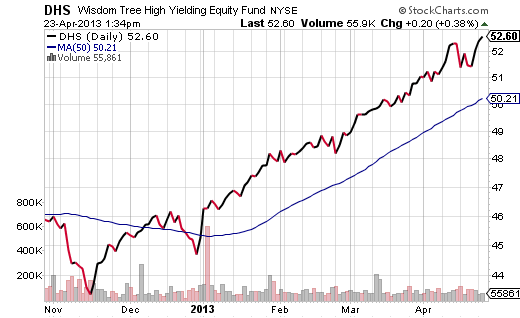
Outside of the U.S., China’s manufacturing segment is trending in the wrong direction with preliminary estimates showing marginal expansion. Similarly, Japan’s economic prospects have been so grim, money printing and yen devaluation have been deemed the only path to restoration. And with the euro-zone region contracting at a rapid clip, world stocks that are tied to growth (e.g., materials, energy, consumer discretionary, etc.) are unlikely to thrive.
My prescription here is quite similar to the one for the U.S. Stick with ETFs that focus on non-cyclical segments that are less tied to the global economic slowdown. These exchange-traded trackers still work because worldwide central bank stimulus means ultra-low interest rates… and ultra-low interest rates means that investors will covet safer equities with dividend cash flow. Two of the better ones include Wisdom Tree Global Equity Income (DEW) and iShares Emerging Market Low Volatility (EEMV).
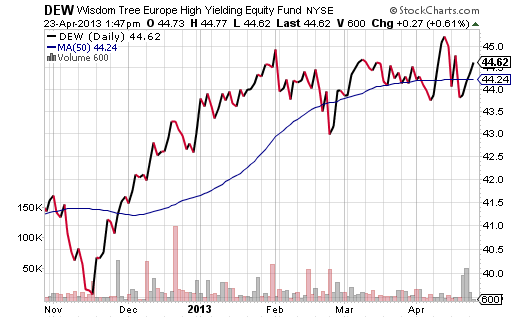
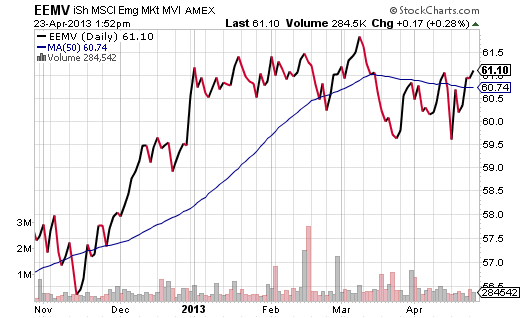
I believe the current rally will fall short of many bullish prognostications. More specifically, I expect selling activity to increase substantially whenever the S&P 500 approaches 1600. In fact, it is fair to expect a 5% to 7% pullback on almost any turn of events, from a series of disappointing earnings to a “Sell in May” mentality to bank instability in Europe. The mere fact that depositors in Cyprus witnessed confiscation of those deposits still has the potential for Italian and Spanish customers to reconsider where they do their banking.
In other words, aggressive short-sellers may wish to take a hard look at shorting iShares Europe Financials (EUFN). Not only is the series of lower lows attractive on a technical basis, but I do not believe we’ll see Spanish bond yields at these 2-year lows for long. Another possibility? Pair-trade investors might go long on WisdomTree Europe Hedged Equity (HEDJ) while simultaneously shorting iShares Europe Financials (EUFN).
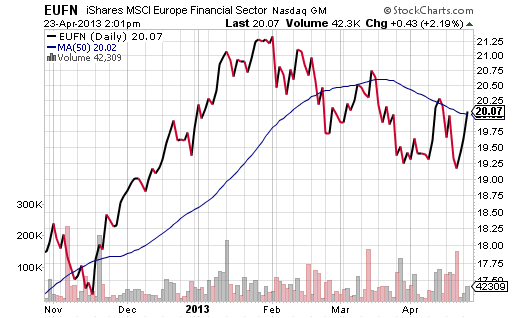
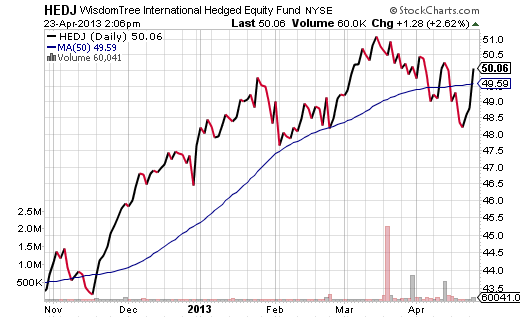
Disclosure: Gary Gordon, MS, CFP is the president of Pacific Park Financial, Inc., a Registered Investment Adviser with the SEC. Gary Gordon, Pacific Park Financial, Inc, and/or its clients may hold positions in the ETFs, mutual funds, and/or any investment asset mentioned above. The commentary does not constitute individualized investment advice. The opinions offered herein are not personalized recommendations to buy, sell or hold securities. At times, issuers of exchange-traded products compensate Pacific Park Financial, Inc. or its subsidiaries for advertising at the ETF Expert web site. ETF Expert content is created independently of any advertising relationships.
I continue to recommend less aggressive dividend income plays like WisdomTree Equity Income (DHS). Its 3.6% yield offsets some of the downside risks that have become parcel and part of 2nd quarter trading. Moreover, its concentration in non-cyclicals (e.g., telecom, pharmaceuticals, staples, utilities, etc.) reduces some of the volatility associated with high-volume sell-offs.

Outside of the U.S., China’s manufacturing segment is trending in the wrong direction with preliminary estimates showing marginal expansion. Similarly, Japan’s economic prospects have been so grim, money printing and yen devaluation have been deemed the only path to restoration. And with the euro-zone region contracting at a rapid clip, world stocks that are tied to growth (e.g., materials, energy, consumer discretionary, etc.) are unlikely to thrive.
My prescription here is quite similar to the one for the U.S. Stick with ETFs that focus on non-cyclical segments that are less tied to the global economic slowdown. These exchange-traded trackers still work because worldwide central bank stimulus means ultra-low interest rates… and ultra-low interest rates means that investors will covet safer equities with dividend cash flow. Two of the better ones include Wisdom Tree Global Equity Income (DEW) and iShares Emerging Market Low Volatility (EEMV).


I believe the current rally will fall short of many bullish prognostications. More specifically, I expect selling activity to increase substantially whenever the S&P 500 approaches 1600. In fact, it is fair to expect a 5% to 7% pullback on almost any turn of events, from a series of disappointing earnings to a “Sell in May” mentality to bank instability in Europe. The mere fact that depositors in Cyprus witnessed confiscation of those deposits still has the potential for Italian and Spanish customers to reconsider where they do their banking.
In other words, aggressive short-sellers may wish to take a hard look at shorting iShares Europe Financials (EUFN). Not only is the series of lower lows attractive on a technical basis, but I do not believe we’ll see Spanish bond yields at these 2-year lows for long. Another possibility? Pair-trade investors might go long on WisdomTree Europe Hedged Equity (HEDJ) while simultaneously shorting iShares Europe Financials (EUFN).


Disclosure: Gary Gordon, MS, CFP is the president of Pacific Park Financial, Inc., a Registered Investment Adviser with the SEC. Gary Gordon, Pacific Park Financial, Inc, and/or its clients may hold positions in the ETFs, mutual funds, and/or any investment asset mentioned above. The commentary does not constitute individualized investment advice. The opinions offered herein are not personalized recommendations to buy, sell or hold securities. At times, issuers of exchange-traded products compensate Pacific Park Financial, Inc. or its subsidiaries for advertising at the ETF Expert web site. ETF Expert content is created independently of any advertising relationships.
